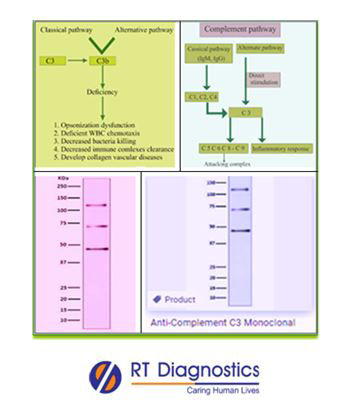COMPLEMENT - C3:
Why Complement (C3) Test?
CLINICAL INFORMATION
Complement: The complement system is made up of a large number of specific plasma proteins that react with one another to opsonize pathogens and induce a series of inflammatory responses that help to fight infection.
Complement is a system of plasma proteins (30 proteins) that can be activated directly by pathogens or indirectly by pathogen–bound antibody leading to a cascade of reactions and generates active components with various effector functions. Complement – C3 and C4 panel tests are the most commonly measured complement components usually performed in patients suspected of recurrent bacterial infections (systemic gram-negative), particularly respiratory infections with encapsulated microorganisms (gram-negative respiratory tract infections), or systemic autoimmune diseases. Complement – C3: This test helps to determine whether deficiencies or abnormalities in the complement system are causing or contributing to a person’s disease or condition. This test is significant to monitor autoimmune disorders and to monitor treatment modalities (prognosis). Complement can be activated by three pathways – Classical, Lectin, and Alternative pathways. Total complement activity may be ordered to look at the integrity of the entire complement system i.e Classic hemolytic complement CH50 test (entire classical complement pathway) or the Alternative hemolytic complement AP50 test. The elevated levels of cytokines such as IL – 1β, IL–6 or TNF can trigger the hepatic synthesis of C3 and C4. Complement – C3 is an acute-phase protein primarily produced by the liver that associates with HDL (HDL –C3) and is also secreted by adipocytes and activated macrophages.
Test for Complement C3 helps to measure the activity of a protein as a part of the complement system in the blood plasma. It serves as a useful tool in the diagnosis of several medical conditions including infections, inflammatory diseases like infective endocarditis, glomerulonephritis – deposition of circulating immune – complexes (inflammation of kidneys), etc. Levels of Complement C3 is also monitored as these levels are increased during inflammation, ulcerative colitis, certain cancers such as leukemia, and Non-Hodgkin lymphoma. Decreased Complement(s) – C3 and C4 are noticed in patients with lupus erythematosis (SLE) since the classical pathway is activated and high immune–complex levels are formed. Deficiency of Complement component – 3 is a rare, genetic, primary immunodeficiency characterized by susceptibility to infection (mainly by gram-negative bacteria) due to extremely low C3 plasma levels. Deficiency (can cause overwhelming sepsis in early life) or lower levels of C3 can lead to recurrent infections with a severe sequel and high morbidity and mortality. Normal or near-normal C3 with very low C4 is characteristic of type –2 and type –3 cryoglobulinemia.

General Instructions:
Sample Requirement: Specimen - Blood sample collected from the vein. Test Preparation: None.
NOTE - Sample for specimen collections may vary based on the patient’s condition/cases according to the patient’s presenting complaints/signs or symptoms:
SPECIMEN REQUIREMENT (Special or Rare Cases) - As instructed and guided by Physician / Clinician / Pathologist / as per Laboratory’s requirements, according to procedures and protocols.
Sample Requirement: Blood Sample taken from the vein
Test Preparation: None
This Multi-Specialty Clinical Referral Laboratory RT DIAGNOSTICS provides precise and accurate tests with an extensive range of testing services to the medical centers to help in the diagnosis and identification of pathology in the test specimens for infectious diseases and also to evaluate the function of organ systems of the patient. It prevents further complications and helps to stabilize and restore health to near normalcy at the earliest without delay.



